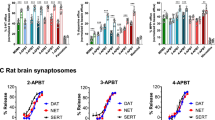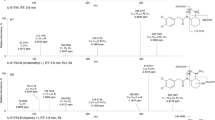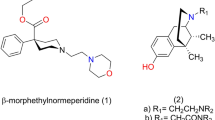Abstract
Analogous to the progression of events in the opiate receptor–enkephalin area, the first reports1–3 that benzodiazepines have selective and specific high-affinity binding sites in brain have stimulated a search for the endogenous ‘ligand’ or substance that might normally act at these sites4–9. Braestrup and co-workers have extracted from human urine a γ-fraction (ref. 10) which they have recently11 identified as β-carboline-3-carboxylic acid ethyl ester (βCEE). They reported that this substance is extremely potent in displacing 3H-diazepam from brain binding sites and proposed that a β-carboline-3-carboxylic acid derivative might, in part, be the endogenous ligand for the brain benzodiazepine receptor. We have examined several synthetically derived β-carboline-3-carboxylic acid analogues and now present data obtained from testing only the βCEE described by Braestrup et al. In addition to confirming these workers' observation that this compound is a potent displacer of 3H-diazepam from brain tissue, our pharmacological data indicate that βCEE has activity that is opposite to, rather than similar to, that of diazepam.
This is a preview of subscription content, access via your institution
Access options
Subscribe to this journal
Receive 51 print issues and online access
$199.00 per year
only $3.90 per issue
Buy this article
- Purchase on Springer Link
- Instant access to full article PDF
Prices may be subject to local taxes which are calculated during checkout
Similar content being viewed by others
References
Squires, R. F. & Braestrup, C. Nature 266, 732–734 (1977).
Mohler, H. & Okada, T. Life Sci. 20, 2101–2110 (1977).
Braestrup, C., Albrechtsen, R. & Squires, R. F. Nature 269, 702–704 (1977).
Colello, G. D., Hockenbery, D. M., Bosmann, H. B., Fuchs, S. & Folkers, K. Proc. natn. Acad. Sci. U.S.A. 75, 6319–6323 (1978).
Skolnick, P., Marangos, P. J., Goodwin, F. K., Edwards, M. & Paul, S. Life Sci. 23, 1473–1480 (1978).
Ally, A. I. et al. Neurosci. Lett. 7, 31–34 (1978).
Asano, T. & Spector, S. Proc. natn. Acad. Sci. U.S.A. 76, 977–981 (1979).
Mohler, H., Polc, P., Cumin, R., Pieri, L. & Kettler, R. Nature 278, 563–565 (1979).
Davis, L. G. & Cohen, R. K. Biochem. biophys. Res. Commun. 92, 141–148 (1980).
Nielsen, M., Gredal, O. & Braestrup, C. Life Sci. 25, 679–686 (1979).
Braestrup, C., Nielsen, M. & Olsen, C. E. Proc. natn. Acad. Sci. U.S.A. 77, 2288–2292 (1980).
Mackerer, C., Kochman, R. L., Bierschenk, B. A. & Bremner, S. S. J. Pharmac. exp. Ther. 206, 405–413 (1978).
Litchfield, J. T. Jr & Wilcoxon, F. J. Pharmac. exp. Ther. 96, 99–113 (1949).
Author information
Authors and Affiliations
Rights and permissions
About this article
Cite this article
Tenen, S., Hirsch, J. β-Carboline-3-carboxylic acid ethyl ester antagonizes diazepam activity. Nature 288, 609–610 (1980). https://doi.org/10.1038/288609a0
Received:
Accepted:
Issue Date:
DOI: https://doi.org/10.1038/288609a0
This article is cited by
-
The GABA-benzodiazepine interaction fifteen years later
Neurochemical Research (1990)
-
Crystal and molecular structure of crenatine carbonate
Journal of Crystallographic and Spectroscopic Research (1990)
Comments
By submitting a comment you agree to abide by our Terms and Community Guidelines. If you find something abusive or that does not comply with our terms or guidelines please flag it as inappropriate.



